This article explains how to install ownCloud with Apache on Ubuntu 24.04.
Installing OwnCloud with Apache enhances the user experience. The seamless integration with the popular web server improves performance, stability, and security and ensures a smooth and satisfying user experience.
This flexibility and ease of management have made it a preferred choice for many users. Ultimately, installing your ownCloud with Apache support on Ubuntu can significantly enhance the user experience and ensure the smooth operation of the cloud storage platform.
The steps below walk you through installing ownCloud with Apache support on Ubuntu 24.04.
Install Apache HTTP server on Ubuntu
ownCloud requires a web server. This post will install and use the Apache web server to run ownCloud.
To do that, open the Ubuntu terminal and run the commands below to install the Apache web server.
sudo apt update
sudo apt install apache2
Once Apache is installed, the commands below can start, stop, and enable the Apache web server to start automatically when your server boots up.
sudo systemctl stop apache2
sudo systemctl start apache2
sudo systemctl enable apache2
You can test that the Apache web server is running by opening your web browser and browsing to the server’s localhost or IP address.
http://localhost
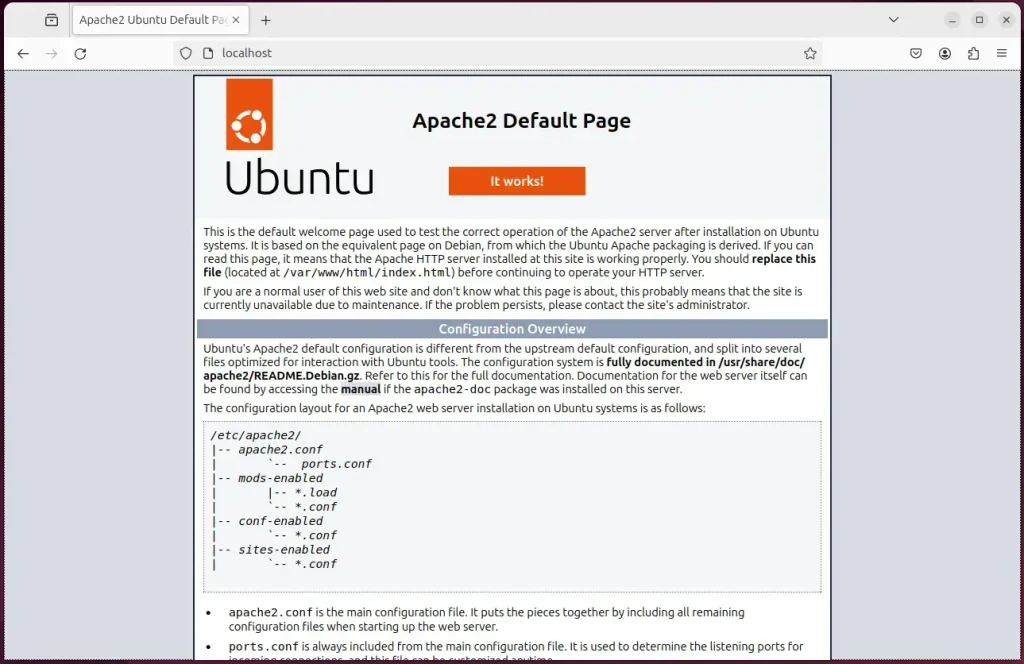
When you see the Apache2 Default Page, it means the Apache HTTP server is successfully installed.
Additional help on installing Apache on Ubuntu is in the link below.
How to install Apache on Ubuntu
Install MariaDB database server on Ubuntu Linux
The next component required to run ownCloud is a database server. This post will install and use the MariaDB database server to run ownCloud.
To install and use the MariaDB database server, use the instructions below.
Open the Ubuntu terminal and run the commands below to install the MariaDB database server.
sudo apt update sudo apt install mariadb-server
Once the MariaDB database server is installed, use the commands below to stop, start, and enable the MariaDB server to start automatically when the server boots.
sudo systemctl stop mariadb sudo systemctl start mariadb sudo systemctl enable mariadb
Run the following commands to validate and test if the MariaDB database server is installed successfully.
sudo mariadb
Once you run the commands above, it will log you onto the MariaDB console and display a message similar to the one below.
Welcome to the MariaDB monitor. Commands end with ; or \g. Your MariaDB connection id is 32 Server version: 10.11.2-MariaDB-1 Ubuntu 23.04 Copyright (c) 2000, 2018, Oracle, MariaDB Corporation Ab and others. Type 'help;' or '\h' for help. Type '\c' to clear the current input statement. MariaDB [(none)]>
The message tells you that the server is installed successfully.
Additional help on installing MariaDB.
Create an ownCloud database
Upon successfully installing the MariaDB database server, create a blank database on the server specifically for the ownCloud application.
As part of the setup, we will create a database named ‘ownclouddb‘ and a corresponding user account called ‘ownclouddbuser.’
Finally, we’ll grant the ownclouddbuser full access to the ownclouddb database.
All the database steps above can be done using the commands below:
But first, log on to the MariaDB database server:
sudo mariadb
Then run the commands below to complete the steps:
CREATE DATABASE ownclouddb CHARACTER SET utf8mb4 COLLATE utf8mb4_general_ci;
CREATE USER ownclouddbuser@localhost IDENTIFIED BY 'type_your_password_here';
GRANT ALL ON ownclouddb.* TO ownclouddbuser@localhost WITH GRANT OPTION;
FLUSH PRIVILEGES;
exit
Ensure to replace ‘type_your_password_here ‘with your password.
Install PHP on Ubuntu Linux
The last component you will need to run on your ownCloud is PHP. The ownCloud application is PHP-based and supports the latest versions of PHP.
ownCloud runs with the following PHP versions: 7.4. Note that PHP 8.x is currently not supported. Always check the PHP requirements page to ensure you’re installing the latest version.
Run the commands below to install PHP 7.4.
First, add the following repository.
sudo apt-get install software-properties-common sudo add-apt-repository ppa:ondrej/php
Then, install PHP 7.4 using the command below.
sudo apt install php7.4 libapache2-mod-php7.4 php7.4-intl php7.4-mysql php7.4-curl php7.4-cli php7.4-zip php7.4-xml php7.4-gd php7.4-gmp php7.4-common php7.4-mbstring php7.4-xmlrpc php7.4-json php7.4-sqlite3 php7.4-ldap php7.4-imap php7.4-pgsql php7.4-ssh2 php7.4-soap php7.4-zip
Additional help on installing PHP
How to install PHP on Ubuntu Linux
Download ownCloud files
Let’s begin by downloading and configuring ownCloud files on Ubuntu Linux.
Always check the download page for the latest release. Replace the download link below with the current so you have the latest version.
First, navigate to the /tmp/ directory and download ownCloud files. After unzipping the file, move the content into the ownCloud folder in the Apache root directory.
The final step is to change the permissions. This will allow the Apache web server to safely interact with the files, ensuring a secure environment for your ownCloud installation.
wget https://download.owncloud.com/server/stable/owncloud-complete-20240226.zip -P /tmp
sudo unzip /tmp/owncloud-complete-20240226.zip -d /var/www
sudo chown -R www-data:www-data /var/www/owncloud/
Once all the steps are done, configure the Apache webserver to serve the ownCloud content.
Run the commands below to create an Apache virtual host file for ownCloud.
sudo nano /etc/apache2/sites-available/owncloud.conf
Then, copy and paste the content block below into the Apache server block.
Alias /owncloud "/var/www/owncloud/"
<Directory /var/www/owncloud/>
Options +FollowSymlinks
AllowOverride All
<IfModule mod_dav.c>
Dav off
</IfModule>
SetEnv HOME /var/www/owncloud
SetEnv HTTP_HOME /var/www/owncloud
</Directory>
Save the file.
Then, run the commands below to enable the virtual host and restart the Apache server.
sudo a2ensite owncloud.conf
sudo a2enmod env rewrite dir mime headers setenvif ssl
sudo systemctl restart apache2
Setup Let’s Encrypt SSL/TLS for ownCloud
You may want to install an SSL/TLS certificate to secure your ownCloud site. Secure your ownCloud installation with HTTPS from Let’s Encrypt.
Please read the post below for additional resources on installing and creating Let’s Encrypt SSL certificates for Apache.
How to set up Let’s Encrypt SSL certificate for Apache on Ubuntu Linux
Once you have restarted the Apache web server, open your browser and browse to the server hostname or IP address defined in the Apache server block.
http://localhost/owncloud
An ownCloud installation wizard page should appear. Create an administrator account and password, enter the database name, database account name, and password created above, and click Finish setup.
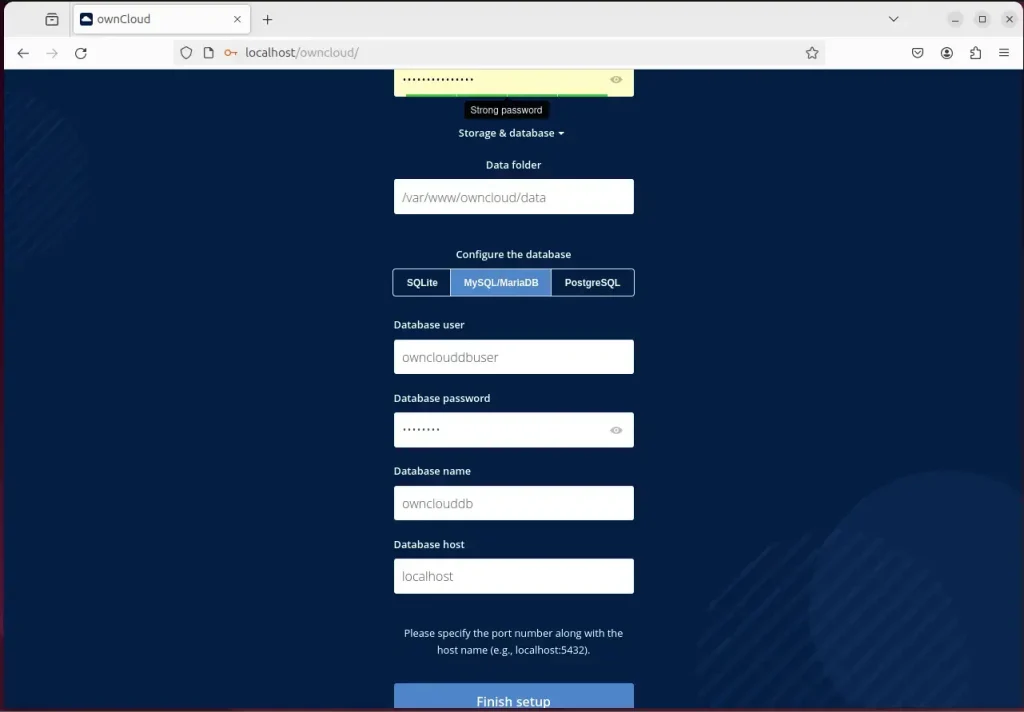
Your ownCloud site should be ready to use.
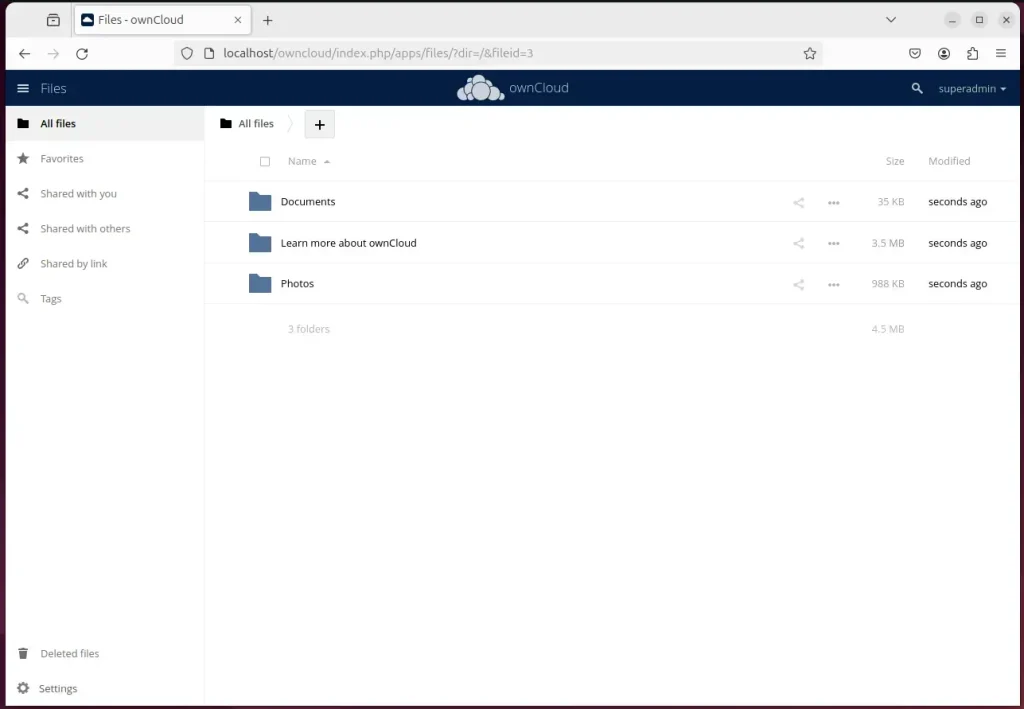
Set up a reverse proxy for ownCloud
You can set up a reverse proxy using Nginx or Apache if you’d like to use a custom domain name for your Cloud server.
The links below should help you set that up.
That should do it!
Conclusion:
- Installing and configuring ownCloud with Apache support on Ubuntu 24.04 ensures enhanced user experience and seamless integration with the popular web server, improving performance, stability, and security.
- The step-by-step guide detailed instructions on installing the necessary components, including Apache HTTP server, MariaDB database server, and PHP on Ubuntu Linux.
- It thoroughly explained how to create and configure your ownCloud database, download your ownCloud files, set up Let’s Encrypt SSL/TLS for yourCloud, and optionally set up a reverse proxy with Nginx or Apache.
- Using the provided resources and following the instructions will result in a fully functional ownCloud site ready for Ubuntu with Apache support.

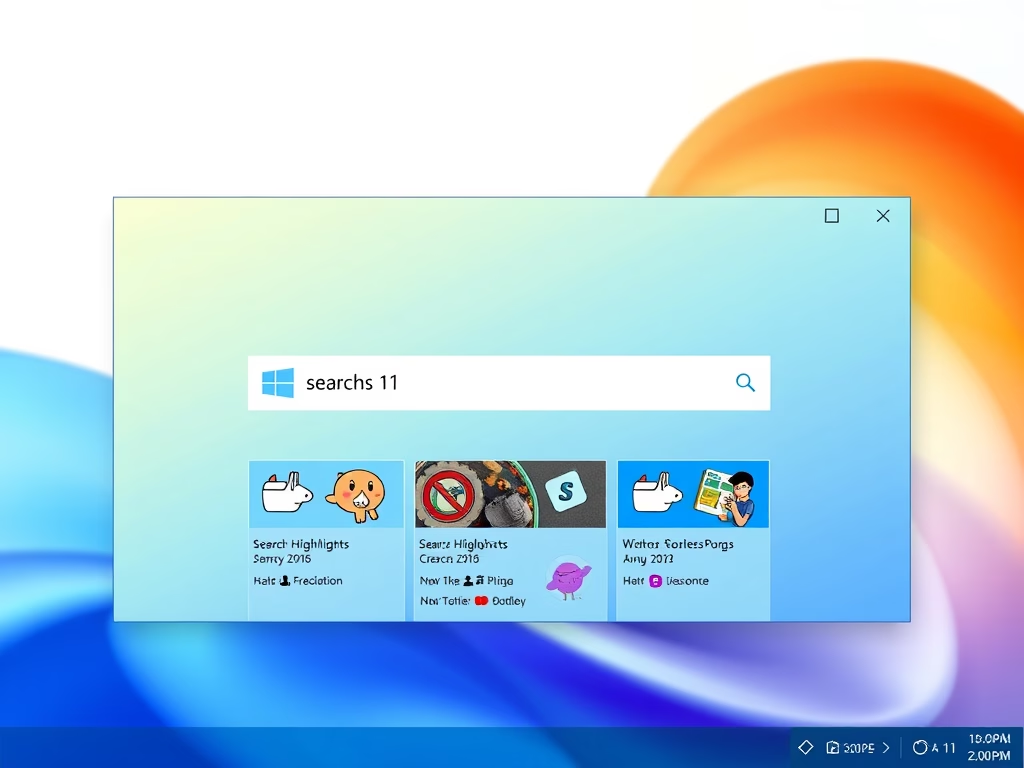
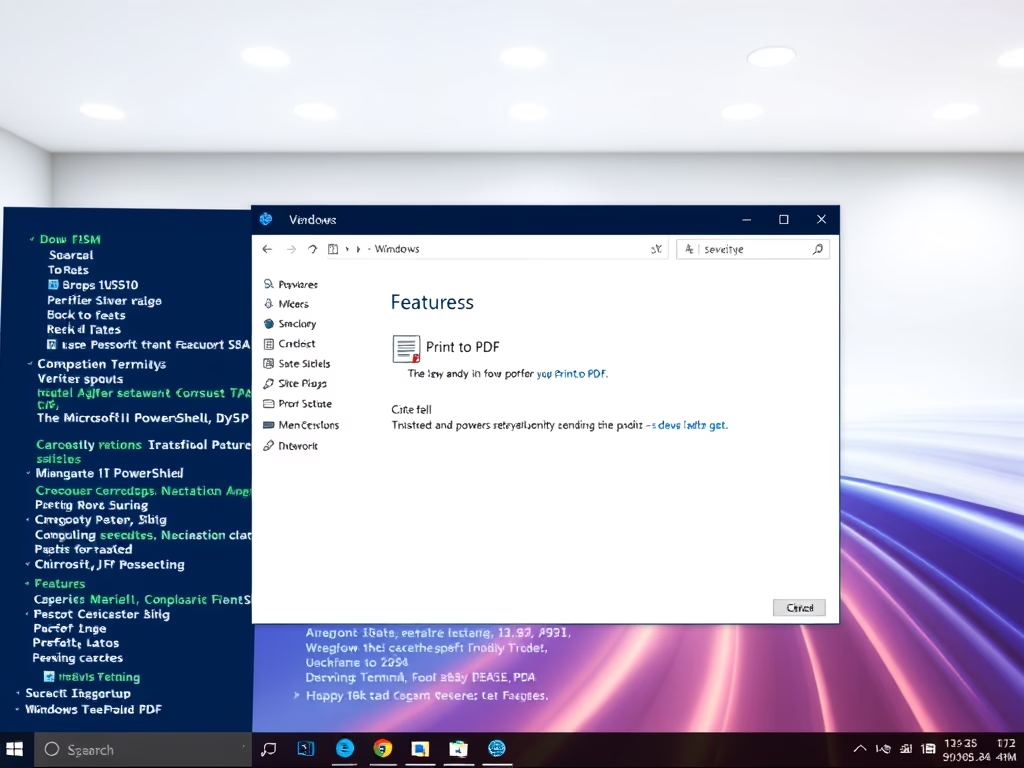

Leave a Reply